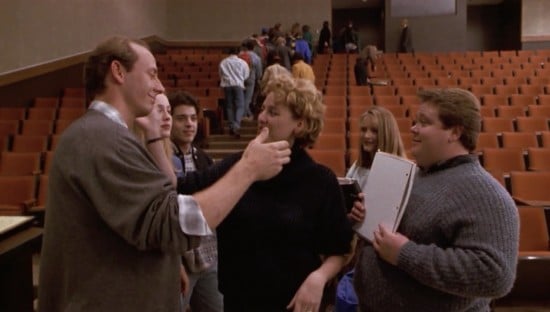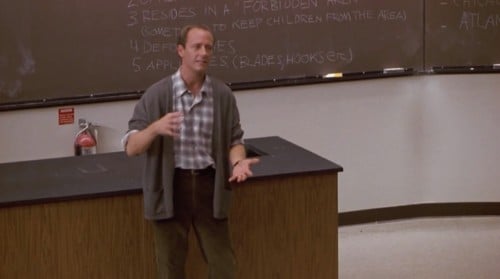Shocking Blocking (45)
By:
January 30, 2013

According to horror exegetes, Bernard Rose’s Candyman is a parable about race, class, and gender in America: Helen (Virginia Madsen), a grad student studying urban legends, is punished because she’s a woman who intrudes upon a male realm (academe), and/or a middle-class Caucasian who intrudes upon an underclass African-American realm (Chicago’s Cabrini-Green project). Such readings miss the point! Instead, Candyman ought to be read as a mashup of Sidney Hayers’s 1962 horror movie Burn Witch Burn, in which a Psychology professor who explains away witchcraft as superstition is tormented by what might be witchcraft, and (in a first-time-as-farce, second-time-as-tragedy way) Frederick Crews’s 1963 parody The Pooh Perplex, a collection of exegetical essays — by fictitious Marxist, Freudian, Christian, Leavisite, and Fiedlerian literary critics — on the topic of Winnie-the-Pooh. The uneasy embrace, in the early scene shown here, between Helen and her husband, a Sociology professor who explains away urban legends as superstructural phenomena, foreshadows the uncanny, Todorovian “fantastique”-type state into which Helen and we will be drawn; like Rose’s earlier movie Paperhouse, this one teeters between realist and supernatural modes. Candyman is a parable about interpretation; its unmentionable boogeyman is hermeneutic vertigo.
PS: Virginia Madsen’s character in this movie must have been the inspiration for Gillian Anderson’s Dana Scully in The X-Files. Her hairdo, her sardonic smile! Who’s with me?
PPS: Below, blackboard scenes from Candyman and Burn Witch Burn.


An occasional series analyzing some of the author’s favorite moments in the positioning or movement of actors in a movie.
THIRTIES (1934–1943): It Happened One Night (1934) | The Man Who Knew Too Much (1934) | The Guv’nor (1935) | The 39 Steps (1935) | Young and Innocent (1937) | The Lady Vanishes (1938) | Mr. Smith Goes to Washington (1939) | The Big Sleep (1939) | The Little Princess (1939) | Gone With the Wind (1939) | His Girl Friday (1940)
FORTIES (1944–1953): The Diary of a Chambermaid (1946) | The Asphalt Jungle (1950) | The African Queen (1951)
FIFTIES (1954–1963): A Bucket of Blood (1959) | Beach Party (1963)
SIXTIES (1964–1973): For Those Who Think Young (1964) | Thunderball (1965) | Clambake (1967) | Bonnie and Clyde (1967) | Madigan (1968) | Wild in the Streets (1968) | Barbarella (1968) | Harold and Maude (1971) | The Mack (1973) | The Long Goodbye (1973)
SEVENTIES (1974–1983): Les Valseuses (1974) | Eraserhead (1976) | The Bad News Bears (1976) | Breaking Away (1979) | Rock’n’Roll High School (1979) | Escape from Alcatraz (1979) | Apocalypse Now (1979) | Caddyshack (1980) | Stripes (1981) | Blade Runner (1982) | Tender Mercies (1983) | Monty Python’s The Meaning of Life (1983)
EIGHTIES (1984–1993): Repo Man (1984) | Buckaroo Banzai (1984) | Raising Arizona (1987) | RoboCop (1987) | Goodfellas (1990) | Candyman (1992) | Dazed and Confused (1993) |
NINETIES (1994–2003): Pulp Fiction (1994) | The Fifth Element (1997)
OUGHTS (2004–13): Nacho Libre (2006) | District 9 (2009)
Joshua Glenn’s books include UNBORED: THE ESSENTIAL FIELD GUIDE TO SERIOUS FUN (with Elizabeth Foy Larsen); and SIGNIFICANT OBJECTS: 100 EXTRAORDINARY STORIES ABOUT ORDINARY THINGS (with Rob Walker).
MORE HORROR ON HILOBROW: Early ’60s Horror, a series by David Smay | Phone Horror, a series by Devin McKinney | Philip Stone’s Hat-Trick | Shocking Blocking: Candyman | Shocking Blocking: A Bucket of Blood | Kenneth Anger | Sax Rohmer | August Derleth | Edgar Ulmer | Vincent Price | Max von Sydow | Lon Chaney Sr. | James Whale | Wes Craven | Roman Polanski | Ed Wood | John Carpenter | George A. Romero | David Cronenberg | Roger Corman | Georges Franju | Shirley Jackson | Jacques Tourneur | Ray Bradbury | Edgar Allan Poe | Algernon Blackwood | H.P. Lovecraft | Clark Ashton Smith | Gaston Leroux |
